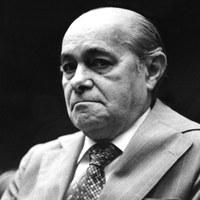São João del Rei, 1910 – São Paulo (Brasil), 1985
By Gilberto Maringoni
The first civilian president of the Republic after the dictatorial period (1964-1985). Although still elected indirectly, Tancredo de Almeida Neves never assumed the office that crowned his long political career. A series of generalized infections combined with a tumor in his abdomen prevented him from taking office on March 15, 1985. He died 38 days after the election. His vice president, José Sarney, from the party that supported the dictatorship, the PFL, ended up governing for the next five years.
A lawyer from Minas Gerais, Tancredo began his career as a city councilor in 1934 in his hometown. His political career was interrupted by the Estado Novo dictatorship in 1937 and resumed only ten years later. He was successively elected state deputy and federal deputy for the PSD (Social Democratic Party) – a center-right party founded by Getúlio Vargas – and became Minister of Justice in Vargas’s second government. He would resume the position in Juscelino Kubitschek’s administration (1956-1960) and was appointed prime minister during the brief parliamentary period (1961-1963), negotiated with the military to ensure the assumption of João Goulart (1961-1964) after Jânio Quadros’s resignation (1961).
With the military coup of 1964, he went into opposition. He joined the Brazilian Democratic Movement (MDB) in 1966, being elected federal deputy several times. In 1978, he was elected senator, and in 1982, he won the gubernatorial race in Minas Gerais, now with the Brazilian Democratic Movement Party (PMDB). Three years later, in the still indirect presidential election, he defeated the government’s candidate, Paulo Maluf, in the Electoral College by 480 votes to 180.

Tancredo had been working on his candidacy since 1983. At the same time, he participated in the rallies of the Diretas Já campaign in 1984, the most significant popular mobilization in the country’s history. With the defeat in Congress of the constitutional amendment that would establish direct elections, he presented himself as a reliable name for the indirect election, both for the opposition and for the military government.
Despite his conservative past and conduct, Tancredo sparked great expectations for change, amid an economic crisis that was eroding the population’s standard of living and a deep crisis of credibility in the dictatorship.
The post-dictatorship regime, named by him as the New Republic in his first speech after the victory, represented an unstable pact between various factions of the ruling class, involving both opposition members and supporters of the military regime.
On the eve of his inauguration, on March 14, 1985, he was hospitalized in Brasília with severe abdominal pain. He died on April 21, leaving his wife, Risoleta Neves, three children, several grandchildren, and a stunned nation. His funeral drew crowds to the streets of São Paulo, Brasília, Belo Horizonte, and São João del Rei. The epitaph he wanted was never written on his tombstone: “Here lies, much to his displeasure, Tancredo de Almeida Neves.”



